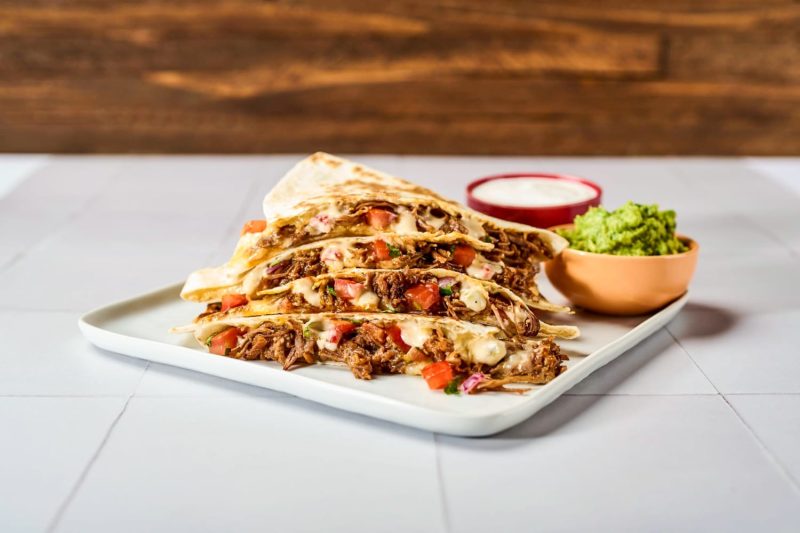Birria, which was once known as a regional Mexican food, has taken on a life of its own in the U.S., becoming a social media star and fast-food darling.
Traditionally, birria is a beef or goat stew, slow cooked with spices and chiles to give the meat lots of flavor. Birria tacos use the slow-cooked meat as a filling and usually include a consommé on the side to dip the taco.
Over the past four years, birria has seen its presence on restaurant menus grow 412%, largely thanks to midscale and casual-dining chains, according to market research firm Datassential. It has made the jump from Mexican-focused restaurants to eateries with broader menus, such as Sugar Factory’s American dining spots and Bowlero’s bowling alleys.
Mexican-inspired fast-food brands such as Qdoba, El Pollo Loco, Del Taco and even Taco Bell have released their own versions of birria, turning it into a new menu staple. And the dish is still growing. Datassential predicts that birria’s menu penetration will more than double over the next four years.
While birria might be newer to U.S. diners, it has been around for centuries in Jalisco, a Mexican state that borders the Pacific Ocean.
Goats, which were originally brought over by Spaniards, had become an invasive species, and eating them was an easy way to take care of the problem, according to Steven Alvarez, a St. John’s University professor who teaches a class on taco literacy. But making goat tasty required spices and chiles. Slow cooking the meat made it tender.
“The goat comes from Europe, the chiles — the guajillo peppers, ancho peppers — are native to the Americas, and they come together to make this thing that is distinctly new,” Alvarez said.
The dish migrated up to Tijuana, Mexico. There, in the 1950s, a taco vendor named Don Guadalupe Zárate swapped out goat for beef because it was cheaper, according to Alvarez. Adding water to make it a stew kept the meat from burning.
Over the past decade, birria moved north, to Los Angeles, where Mexican immigrants dished out tacos and consommé from food trucks such as Birrieria Gonzalez.
“What’s beautiful about [southern California] is that the Mexican food is always, constantly regenerated by what’s going on in Mexico, based on the immigration patterns,” Alvarez said.
More recently, birria took off in New York City, with restaurants and food trucks serving up tacos and consommé across the five boroughs.
But the true inflection point for birria came thanks to Instagram. Food influencers’ photos of birria tacos, with their beef cascading down into a cup of consommé, made mouths water, and introduced a new audience to the food, according to Alvarez. Once TikTok took off, so did videos of birria, whether for reviews of the restaurants and food trucks serving it or for recipes to make it at home.
Social media is partly why birria became a staple on Qdoba’s menu.
Katy Velazquez, director of culinary innovation for Qdoba, was first introduced to birria while in Mexico for a previous job. Later, while back in the U.S., she started seeing the food pick up online, thanks to “sexy cheese pull shots” on social media, she said.
Cut to the Covid-19 pandemic, when brisket prices were soaring, and Qdoba had to remove its Tex Mex-inspired version of brisket from its menu.
“We were losing money on every entrée that we sold,” Velazquez said.
But that loss gave her team the opportunity to create their own take on birria, using brisket as its base. The fast-casual chain’s final product is not made the same way that traditional birria is, but Velazquez and her team aimed to emulate the same flavor and tenderness.
“We get the benefit of seasonings that have hours of tomatoes that are reduced and simmered and then they get dehydrated and brought into it, so we get the same effect and flavor without hours and hours of work,” she said.
Qdoba introduced its birria two years ago, replacing its previous brisket entree permanently and charging customers extra for the new protein option. Since the chain is privately owned by Butterfly Equity, it does not disclose its financial results, including more details about the success of the launch.
This fall, the chain is repromoting its birria offerings, betting that its flavor will appeal to customers looking for a cozy lunch or dinner, Velazquez said.
“We’re really proud of it, and we’re proud to be able to bring something that was a regional Mexican cuisine to a really large audience at a brand like ours,” she added.
Birria’s fanbase is not growing just because Qdoba and other large restaurant chains have added it to their menus. It is also because of its own versatility, Christine Couvelier, a culinary trendspotter and founder of the Culinary Concierge, told CNBC.
“This is a dish that is not about heat — it’s flavor,” Couvelier said. “So when consumers try it on a menu, they aren’t afraid or surprised. This is a flavor that is cooked low and slow.”
Couvelier envisions many different possible iterations for birria: on top of poutine, in soups and even stuffed in ravioli. She has also started to see some packaged food companies experiment with sauces that include the flavors of birria.
“It has switched from a specific dish to a protein and can be found across the menu,” said Claire Conaghan, Datassential trendologist and associate director.
Now that birria is usually made using beef, it can be paired with nearly anything, Conaghan added.
According to Datassential, tacos are the most popular birria dishes found on menus, but the firm’s Menu Trends platform has also found birria quesadillas, grilled cheese, breakfast dishes and even ramen.
Birria ramen first popped up in Tijuana, Mexico, according to Alvarez. But it has made its way stateside, and even appeared on Del Taco’s menu.
Jeremias Aguayo, Del Taco’s senior director of culinary research and development, rejoined the chain’s culinary team in 2022, shortly after Jack in the Box bought Del Taco. He personally took on the goal of creating Del Taco’s take on birria.
The consommé recipe alone took Aguayo four months and 17 attempts to make just right, he said. At the same time, Del Taco came up with its beef birria recipe. The chain launched its quesabirria taco, birria quesadilla and birria ramen at the same time last November.
The result was Del Taco’s biggest promotion in years, leading to “big jumps” in sales, traffic and check average, according to Aguayo. Del Taco sold upward of one million birria ramen at more than 600 restaurants over two promotional windows.





























